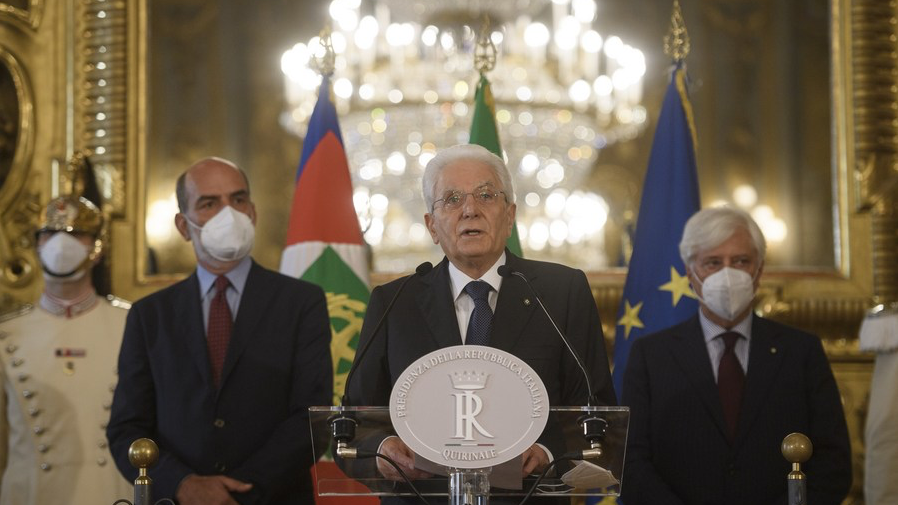
Italy central to ECB rate rise
Note Editor: Freddie Reidy is a freelance writer based in London. He studied the history and history of art at the University of Kent, Canterbury, which specialized in Russian history and international politics. The article reflects the opinion of the author, and not necessarily CGTN’s view.
June 21 gave witnesses of two important moments in European affairs, the first was confirmation that Italian Prime Minister Mario Draghi would resign after the collapse of the coalition government. The second is the announcement by the European Central Bank (ECB) that interest rates will increase by 0.5 percent.
While significant, the two events carry an inevitable atmosphere. Italy has had 69 surprising governments since World War II and the increase in ECB interest rates to 0 percent only follow the US Federal Reserve (FED) movement and the Bank of England.
Recognizing “drag on growth” caused by conflicts in Ukraine, ECB President Christine Lagarde hinted in the intention to prepare for a long -term economic campaign. He said, “We hope that inflation remains high that is not desirable for some time because of the sustainable pressure from the price of energy and food and pipe pressure in the price determination chain.”
Limiting eight years of ECB policy in raising interest rates above negative is of course a significant moment but many question the impact of these actions, especially compared to the steps taken by the Fed which is expected to announce a further level in the coming weeks. An increase of 0.5 percent is higher than the increase of 0.25 percent anticipated.
Carsten Brzeski, head of the Euro Zone Economist in Ing argued that “The hiking level of 0.5 points percentage and softening guidelines forward shows that the ECB thinks windows for a series of interest rates are closed quickly.”
One of the driving force of the 0.5 percent increase is more radical than further energy problems because the European Union asks members to start the allotment of natural gas. However, the ECB is limited in the scope of intervention by political reality in blocks, especially in connection with Italy.
Lagarde is well aware of the precarious Italian economic position where inflation has been at the highest level since 1986, while public debt is 150 percent of GDP. Italy’s ability to serve its debt must be preserved to prevent broader market shocks.
The new Italian government also needs to continue the economic reform program needed to secure 200 billion vital euros ($ 204.54 billion) from European recovery funds. However, many of these economic reforms are behind the collapse of the Draghi government and not guaranteed to be sent or at least not on the time scale required.
Speaking to The Financial Times, Krishna Guha, Head of Policy at the Evercore Investment Bank warned that “The combination of the stagflation of the giant stagflation of brewing from Russia’s natural gas that is armed and the political crisis in Italy is almost as close as possible with the perfect storm as can be imagined by the ECB by him. “
Avoiding the Italian economic crisis will depend on the residual political will to pass the 2023 budget while Draghi remains the PM between intergroups before the upcoming general election. The second need is the speed in the formation of what is likely to be a new right -wing coalition led by Giorgia Meloni, leader of the party “Brothers of Italy”. Political pauses can spell economic disasters.
For ECB and a wider Euro zone, a quick resolution for events in Italy is very important because the European Union can do bad situations similar to Greek bailouts in 2010 which triggered ECB moving to negative interest rates that had just withdrawn.
The challenge for Lagarde and ECB is a double requirement for controlling inflation and EU unity. The President of the Bank has long rejected the “creep mission”, during the economic difficulty, money talks. Announcement of New Transmission Protection Instruments (TPI) is a key component in this mission. This instrument is designed to protect against situations where the loan costs between members increase in such a way that an unprecedented solution is needed from the Euro zone.
Underline the severity of the situation, TPI is not limited to purchasing power with Lagarde also stating that banks have “sovereignty” in how the tool is used.
The hope of the bank is that by launching a fairly large economic warehouse with such strength, it will calm the market and investors and eliminate its spread. However, whether this economic defense can withstand the strength of political reality must still be seen.







